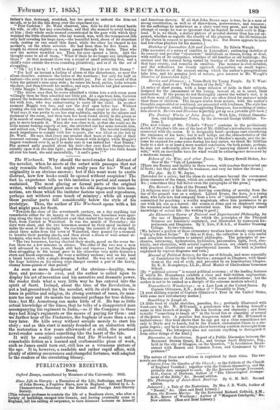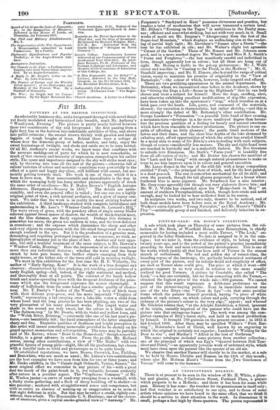PUBLICATIONS RECEIVED.
Boon.
Oxford Essays, contributed by Members of the University. 1856.
Slave Life in 'Georgia : a Narrative of the Life, Sufferings, and Escape of John Brown a Fugitive Slave, now in England. Edited by L A. Chamerovzow,'Becretary of the British and Foreign Anti-Slavery Society.
[This volume professes to contain the life of a Southern slave, who after a variety of hardships escaped into Canada, and having eventually come to England, left his calling of carpenter, to turn itineraut lecturer on himself
and American slavery. If all that John Brown says is true, he is a man of strong constitution, as well as of shrewdness, perseverance, and resource' • for the sufferings he underwent as a slave were very great, and on his first attempt at escape he was- so ignorant that he fancied he could walk to Eng- land. It is, we think, a darker picture of imedial slavery than has yet ap- peared, whether as regards the cruelty of the planters, or the ill-treatment of the slaves in respect to provisions, dress, &c. But Brown appears to have had low-class planters for his masters.] Sketches of Lancashire Life and Localities. By Edwin Waugh.
[The narrative of a series of rambles in Lancashire ; embracing sketches of its ecenerj and peculiar "characters" individuals or classes, living or dead, with notices of its antiquities, whether of old families or old buildings; the ancient and the natural being varied by touches of the worldly progress of that busy county, and remarks de omnibus. The manner is over-detailed, and the reflections too closely approach disquisition on small topics; but the freshness of the scenery among which the author's peregrinations take him, and his genuine love of nature, give interest to Mr. Waugh's Sketches of Lancashire Life.]
Berries and Blossoms ; a Verse-Book for Young People. By T. West- wood, Author of "The Burden of the Bell," &c. [A series of short poems, with a large infusion of fable in their subjects, designed for the amusement of the young, instead of, as is usual, their instruction. If the poems do not thoroughly answer the writer's end, it is not from want of ability, but because they are often fitted for maturer minds than those of children. The images drawn from nature, with the author's thoughts superadded or combined, are presented with liveliness. The style has a quaint freshness, which, though suggesting Tennyson, has nothing of imita- tion about it. Berries and Blossoms is prettily got up as a juvenile gift-book.] The Poetical Works of John Drydcti. With Life, Critical Disserta- tion, and Explanatary Notes, by the Reverend George Gilfillan. Ye. lame I.
[The new volume of Mr. Nichors "Poets" contains in the preliminary sketch of Dryden's life one of the best of Mr. Gilfillan's introductory memoirs connected with the series. It is designedly brief—perhaps curt considering the eminence of his hero ; but it well brings out the characteristics of the poet's life and career. As regards the laxity of Dryden'a morals, and the in- come he enjoyed for some years during his mid career, we think Mr. Gilfillan leads to a new or at least a more marked conclusion. On both points, perhaps, he does not sufficiently allow for the poet's "marrying discord in a noble wife," with an inevitable turn for what would be extravagance measured by a moderate income.] Echoes of the War, and other Poems. By Henry Sewell Stokes, Au- thor of the "Vale of Lanherne."
[There are fluency and facility in these verses, with touches that remind one of Scott ; but they are diffuse to weakness, and very far below the theme.] The Age. By C. W. Jayne.
[Intended for a satire; -but the ideas do not advance beyond the commonest prose censures of the times which are continually met with in newspapers; &c. ; sometimes they fall below even the paragraphs of the press.]
The Recruit; a Tale of the Present War.
[A. religious story of the old kind, deriving something of novelty from the use of the present war as a subject. . Lilford Evans, the hero, s a young man, who falls into bad company from a love of " independence,"iand gets committed for poaching : a worthy magistrate offers him permission to go out with his son as a recruit : the scenes at Alma and on shipboard among the wounded send him home a converted man. The story displays small knowledge of actual life : the writing is good.] An Elementary Course of Natural and _Experimental Philosophy, for the use of Beginners. In Wilds the principles of the Physical Sciences are familiarly explained, and illustrated by numerous Ex- periments and Diagrams. By T. Tate, F.R.A.S., of kneller Training College. In two volumes.
[We believe a portion of these elementary treatises have already appeared in " Gleig's School Series." Be this as it may, the collection is a very useful and complete introduction to natural philosophy. The principles of me- chanics, astronomy, hydrostatics, hydraulics, pneumatics, light, heat, elec- tricity, and chemistry, with several cognate sciences, are clearly explained, with practical illustrations and experimental lessons. The text is_further explained by copious diagrams and cuts.]
Manual of Political Science, for the use of Schools, 'and more especially of Candidates for the Civil Service, arranged in Chapters, with Ques tions at the end of each, and preceded by an Introductory Chapter. By E. It. Humphreys, LL.D., Head Master of Cheltenham Grammar School.
[By "political science" is meant political economy ; of the leading features of which Dr. Humphreys exhibits a clear and well-written explanation. The doctrines are those of Adam Smith, with some modifications; but the author is not to be ranked as a disciple of the extreme modern school.] Transatlantic Wanderings' or a Last Look at the United States. By Captain Oldmixon, R.N.,Author of "Piccadilly to Pere." [A neat shilling. reprint of Captain Oldmixon's Tour in the United States, with some new introductory matter.]
Something to Laugh at.
[A little book of slight sketches, parodies, &c. ; profusely illustrated with wood-cuts by Mr. W. M'Connell a gentleman who is making himself a name in this branch of design. He has freedom and character ; and there is really "something to laugh at" in the broad fun or absurdity of severe/ of the prints here. A peculiar but dangerous talent of Mr. II`Connell is imitativeness : this book shows that he can get up a close resemblance not only to Doyle and to Leech, but to the French caricaturist Cham in a sin- gular degree ; and he is not always above borrowing a notion downright from a predecessor. The letterpress does not contain anything to distinguish it from other things of the kind.] Discussion on Secularism. Report of a Public Discussion between the Reverend Brewin Grant, B.A.' and George Jacob Holyoake, Esq., held in the city of Glasgow, on the Question, "Is Secularism Incon- sistent with Reason and Common Sense, and Condemned by Ex- perience ?"
The nature of these new editions is explained by their titles. The two novels are cheap books.
_Flowers from the Garden of the Church; or the Collects of the Cherch of England Versified ; -together with the Collects themselves, and the probable date assigned to each. By the Reverend George Townsend, D.D , Canon of Durham Author of "The Chronological Arrange- mentof the Bible," &c. 'Second edition. The Philosophy al Joint-Stock Banking. By G. M. Bell. Second
edition.
Jukimerk ; a Tale of the Nestorians. By Mrs. J. B. Webb, Author of
"Naomi," &c. (Run and Read Library.)
Zenon, the Roman Martyr. By the Reverend Richard Cobbold, R.D. , Rector of Wortham; Author of "Margaret Catchpole," &a. New edition. (Run and Read Library.)
Pzuemems.
4eech of his Grace the Duke of Newcastle, 4.c., on the Resignation of Ministers, delivered in the House of Lords, on Thursday, 1st February 1855.
Our Mil and Military Establishments. No. I.
The Organization of the War Department. A Memorandum submitted to Lord Palmerston. By a Peelite.
Diplomatic Mystificatioris and Popular Credulity; or the Anglo-French .Alli-
MUM.
Anonymous journalism.
Our Consuls in the East: a Parliamentary Inquiry into their Proceedings impera- tive. By an Anglo-Levantine.
A Reply to Mr. Bright's Letter on the War. By John Coleman.
The Powers of Europe and the World's Great Quarrel; or the Philosophy and Morality of the Present War. By a Student of Humanity.
The War; its Origin and its Conse- quences. By the Right Reverend Ho-
ratio Southgate, D.D., Bishop of the Protestant *piscopal Church in Ame- rica.
Remarks on the Naval Operations in the Black Sea, and the Siege of Sevastopol. By General Sir Howard Douglas, Bart, G.C.B., &c. (Extracted from the fourth edition of " Douglas on Naval Gunnery.") Queen's College. Introductory Lecture delivered at the Commencement of the Academical Year 1851-1855. By Adol- phus Bernays, Ph.D., Professor of the German Language and Literature, and Member of the Committee of Education of this College, &c.
"Is Man Responsible for his Belief!" a Lecture, delivered in the City Hall, Glasgow, on the 23.1 October 185i. by the Reverend Brewin Grant, B.A.
Indisputable Life Policies. Insurable In- terest. (Extracted from " The Regis- ter.") Church Questions. A Letter to a Friend.



























 Previous page
Previous page